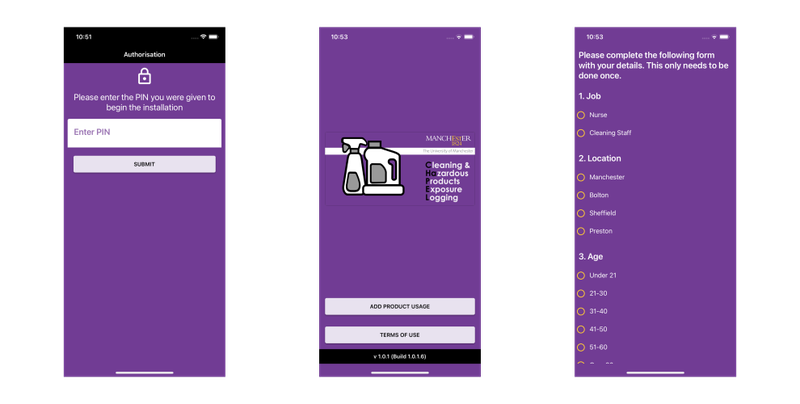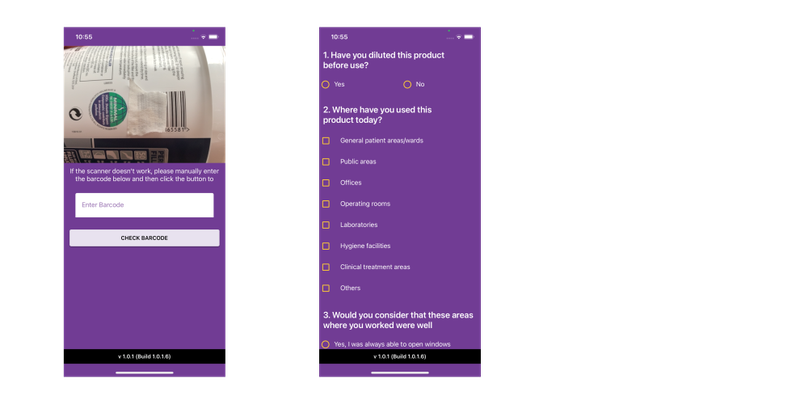The role of cleanliness in the medical field has long been understood to be a necessity, with wound-washing and antiseptic treatment being done in the first century A.D. Since then, the goal of reducing infection rates by cleaning has been extended to the areas where sick people are gathered and treated, and disinfection procedures are now commonplace and, indeed, legally required in much of the world.
However, as our understanding of bacteria has developed, so has the effectiveness of the cleaning solutions used to combat them, but this increase in efficiency has come at a cost – a shift towards the usage of stronger and potentially more harmful chemical products.
Sewon’s main focus is on examining the exposure of cleaning workers in hospitals to hazardous chemicals, in particular those which may cause respiratory problems. To gather data, Sewon wanted to develop his own mobile app and the MDS were contacted to support him in doing so. The app, called CHaPEL (Cleaning & Hazardous Product Exposure Logging), allows users to supply data on products used, ventilation of the environment they are used in, details of any dilution and the amount of time exposed to it.
Research will then be undertaken as part of Sewon’s final project to look at any correlation between respiratory issues and chemical exposure.
Why a Mobile App?
In the initial project meetings it was quickly agreed that although a key part of the data collection could be done using a simple survey type software tool like Qualtrics, it was essential that the answers were linked to the specific product being used. Sewon already had a database containing typical cleaning products used in NHS hospitals. Rather than asking a user to spend time typing in details associated with a product, it was decided that identifying a specific product via a barcode scanner would be both easier for the user and more reliable for the researchers. The resulting app therefore couples a database of products to a barcode scanner and some additional survey elements, all within the same package.
About the App
Although the app is available on both the Android and iOS platforms, via their respective stores, its installation on a device is PIN protected to restrict data entry/collection to a known user base with whom the PIN has been shared.
Upon first launch a minimal amount of demographic data (job, city, age range, gender) is gathered, then the app’s main landing page is displayed where the user can choose to either view the Terms of Use information, including the app’s privacy policy and accessibility statement, or to undertake a barcode scan of a product.
Aiming the phone’s camera at the chemical container’s barcode initiates a scan of the digits to be matched to a specific item in the locally stored database of over 300 known products. If the scan fails to capture the barcode (due to low light and/or a damaged image for example) the digits can be manually supplied by the user.
Once the product has been successfully identified a short questionnaire is presented to gather the relevant data on the product’s usage. Upon failure to match to a known product, the digits are stored to be sent with the rest of the data for later identification. Tapping the submit button will then send the data to a University managed server which is accessible to project team members so they can download the collected, anonymised results for analysis.


Benefits of having MDS Support
Whether you are a seasoned programmer or a complete novice, having MDS alongside you to support your development offers numerous benefits to developing it on your own including:
- We have solved a lot of problems over the years, and we may have a library or plugin you can use out the box to solve your problem.
- We have client libraries to make it easy to connect to University services including data storage systems.
- We have robust governance processes for ensuring your app is legal and compliant for use in research and teaching.
- We are professional software engineers and enjoy imparting our knowledge to help you learn and improve.
Get in Touch
The MDS is always looking to be flexible, adapting its processes to meet the ever-changing needs of our community. If you have any suggestions for us, please email us and let us know!
To cost a developer onto a proposal and secure us to work on your project, contact the MDS Lead, Adrian Harwood, send us a message via the MDS email address or use the Connect form to submit a request.

